Last Updated on December 19, 2022 by Gaga
Medically reviewed by Dr. Harshi Dhingra
Written by Gaga
Just as the skin on your face and body needs regular cleansing and care, your scalp needs to get rid of everything that may interfere with its normal function. By adding a scalp exfoliation treatment to your hair care routine, you can help your hair to grow healthy and strong. On the other hand, if you neglect this basic scalp care step, the consequences can be weakening of the hair follicles, flaky scalp, and thinning hair.
The skin of the scalp contains sebaceous glands that produce sebum, making hair moisturized and shiny. Unfortunately, excess sebum and dead skin cells can accumulate and clog pores, interfering with the normal functioning of hair follicles. This may lead to scalp inflammation, and dandruff, and can also negatively affect hair growth.
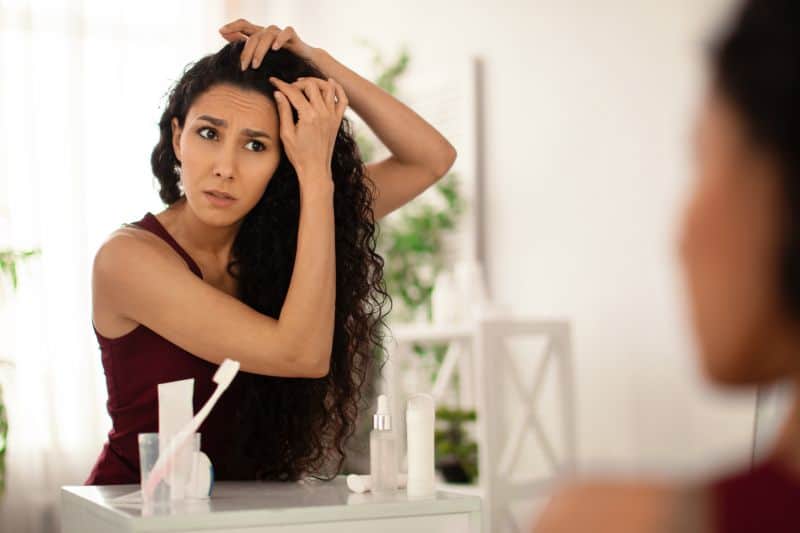
The problem can get worse if you use too many styling products. Residues of hair products can build up on the scalp, making your hair look limp and dull. For a healthy scalp and healthy hair, it is not enough to just wash your hair regularly. It is important to periodically exfoliate your scalp to keep it healthy.
What is Scalp Exfoliation?
Deep scalp cleansing is an essential part of a healthy hair regimen. Many people are not aware of the importance of scalp exfoliation. Regular exfoliation removes harmful deposits and helps maintain a healthy scalp and hair. By removing buildup from the scalp, the skin can breathe and revitalize, and the oil glands will optimize their functionality.
After the exfoliation treatment, the scalp feels refreshed and the appearance of your hair is improved, which could positively affect your self-confidence.
Everyone can benefit from periodical scalp exfoliation and enjoy the many benefits that this treatment offers.
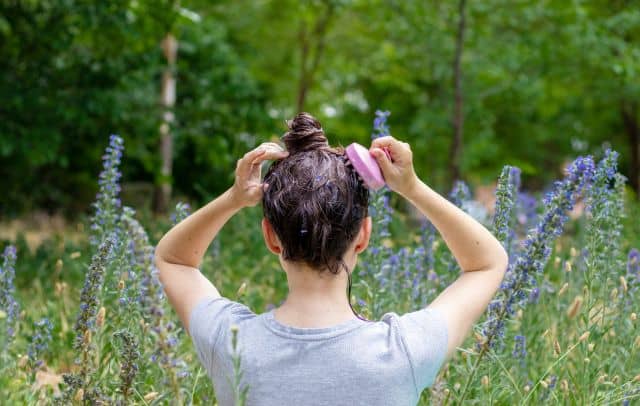
Benefits of Scalp Exfoliation Treatment
- Removes buildup: The importance of removing deposits from hair styling products can be compared to the removal of makeup from your face. Scalp exfoliation keeps the scalp free of product buildup and prevents dead skin cells, sebum, and impurities from clogging the pores. Refreshed scalp results in faster cellular turnover and enhanced follicle function.
- Boosts circulation: Regular exfoliation and scalp massage stimulate blood flow and invigorate the scalp. The massage can be performed with the fingertips or with a massage brush and with the use of scalp scrubbing products. Better circulation means more oxygen and nutrients will reach the follicles, creating a better environment for healthy hair growth.
- Relieves dryness and dandruff: Sebum creates a protective layer on the scalp and provides vital moisture to the hair. Scalp exfoliation loosens up stubborn flakes, washes out dead skin cells, and keeps dandruff at bay. Exfoliation enables the efficient functioning of sebaceous glands, keeping the scalp and hair hydrated and healthy.
- Soothes and balances the scalp: If you often find yourself scratching your scalp, a gentle scalp exfoliator might be a solution. The buildup of dead skin cells and hair products can upset the pH balance of the scalp. The optimal pH level of the scalp is from 4.5 to 5. The proper pH balance may act protectively against bacterial and fungal infections. A moisturizing scalp exfoliating treatment helps to keep the scalp clean and healthy and soothes the itchiness caused by inflammation and dryness.
- Promotes hair growth: A healthy scalp is closely related to hair growth and quality. Too much accumulated dead skin cells and hair product residues block the normal functioning of follicles and interfere with hair growth. The removal of the debris from your scalp supports the proper functioning of hair follicles, causes loose hairs to fall out, and optimizes the environment for healthy hair growth.
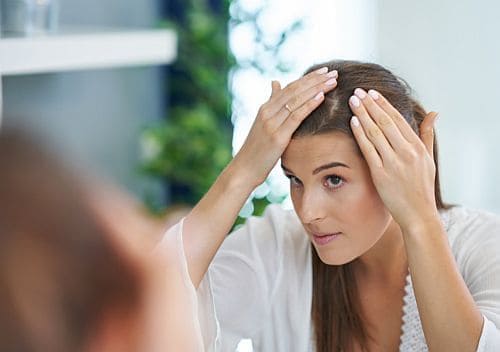
How to Exfoliate Your Scalp
There are two methods of scalp exfoliation: physical and chemical exfoliation. Chemical exfoliation is performed by using chemical peel exfoliants such as glycolic acid. Physical exfoliation or scrubbing is performed using some coarse substances such as sea salt or sugar scrub. Both methods have their advantages but it takes some learning and trials to determine which method works better for you. Most exfoliating products are supposed to be used as a pre-shampoo treatment. Make sure to massage the scrub with light pressure to prevent scalp irritation, hair breakage, and knotting.
How Often Should You Exfoliate Your Scalp?
The frequency of scalp cleansing exfoliation depends on the condition of your scalp and the product you use. It would be a good start to exfoliate once every two weeks. More frequent exfoliation can worsen the condition of sensitive scalps. Always read the product label to make sure that you apply it correctly and at the optimal frequency. If you have a scalp disease, you need to consult a dermatologist before you start exfoliating.
What Scalp Exfoliator to Use?
If your scalp has excess oil, exfoliators based on clay and charcoal are a good choice. For a dry and flaky scalp, a sugar-based scrub enriched with moisturizing oils may be a better option.
- Drunk Elephant T.L.C. Happi Scalp Scrub uses an amino acid blend and plant oils to gently dissolve pore-clogging grime for a healthy scalp and shiny hair. This scalp scrub is a good choice if you have a dry scalp that needs moisturizing and revitalizing exfoliators.
- Amika Reset Pink Charcoal Scalp Cleansing Oil is a gentle, pre-shampoo scalp treatment that uses clay, charcoal, sea buckthorn berry, and flower extracts to refresh, detoxify, and invigorate the scalp. It removes product and grease buildup, promotes antioxidants and oxygen flow, and provides fast relief from the itchy and scaly scalp.
- Truss Scrub Therapy Scalp Exfoliant Treatment uses minty menthol, apricot microspheres, prebiotics, and antioxidants to break down buildup and soothe an itchy scalp. It provides a refreshing sensation and prevents fungal infection and dandruff.
- Yes to Tea Tree Scalp Relief Gentle & Soothing Pre-Shampoo Scalp Scrub is formulated with 99% natural ingredients, including tea tree oil, sage oil, witch hazel, and apple cider vinegar to nourish and clarify the scalp before shampooing. Tea tree oil gives a strong tingly sensation. This scrub eliminates excess oil and buildup without causing dryness and helps soothe sensitive, itchy scalp. Shake the bottle before using this product.
Exfoliating Shampoos
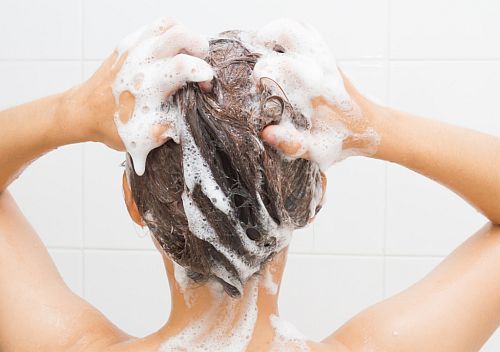
- Aveda Invati Advanced Exfoliating Shampoo contains salicylic acid that can control oil production and dissolve build-up that can clog pores. This color-safe formula gently exfoliates and nourishes the scalp, which results in healthier and denser hair.
- Briogeo Scalp Revival Charcoal and Coconut Oil Micro-Exfoliating Shampoo uses charcoal, tea tree oil, and vegetable-derived micro-exfoliators to remove dead skin cells, impurities, and product build-up from the scalp pores. Scalp Revival Shampoo helps to maintain a healthy scalp pH level, provides relief for dry, flaky scalps, and strengthens the hair shaft for healthier and fuller hair.
Scalp Exfoliator Brush
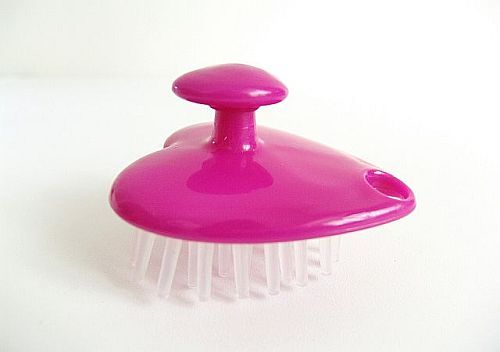
Finally, don’t forget this small hair tool that makes scalp exfoliating more effective and also provides you with an enjoyable washing experience. Massaging your scalp promotes blood circulation, combs out the buildup, and eases itchiness. Get a relaxing massage without chipping your nail polish during washing your hair.
There are numerous shampoo brushes available on the market, but Scalp Care Hair Brush by HEETA is definitely worth your attention.
Gaga is a blogger and founder of the Softer Hair website. She often says that insomnia is to blame for her first blogging attempts. Being the night owl, she hated the morning alarm. She left her office job and returned to what she loved most - writing.

